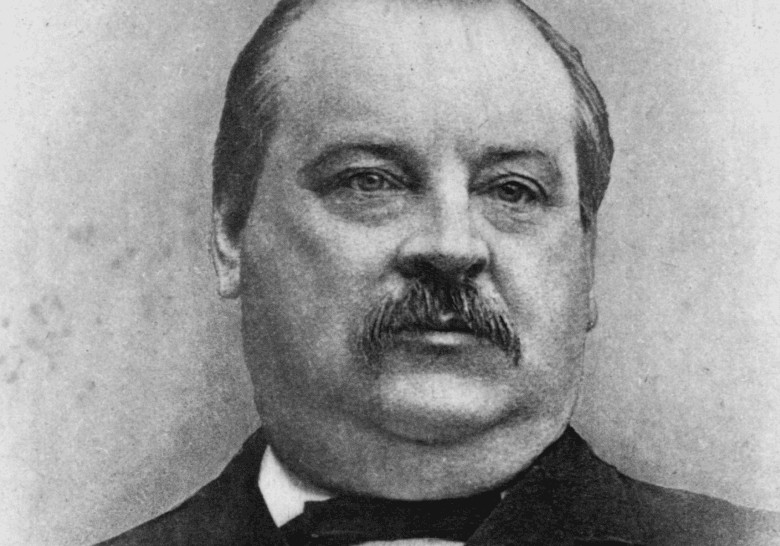Grover Cleveland’s Veto of the Texas Seed Bill, 1887
Use this primary source text to explore key historical events.
Suggested Sequencing
- Use this Primary Source to allow students to analyze Grover Cleveland’s strict constructionist views and support of small government during the Gilded Age.
Introduction
Grover Cleveland was the first Democrat to be elected president after the Civil War and the only president to serve two nonconsecutive terms in the White House, a feat that demonstrated the single-minded tenacity he used to try to implement what he understood the Constitution to say. Cleveland, a strict constructionist, believed individual citizens were capable of decision-making without the need for a parental relationship with the federal government. During his first term, this belief was challenged by proposed legislation to alleviate the consequences of a drought in the state of Texas. Amid the calls for more federal assistance, President Cleveland stood firm and vetoed the legislation.
Sourcing Questions
- Who wrote this document?
- Who was the author’s intended audience, beyond Congress?
| Vocabulary | Text |
|---|---|
| It is represented that a long-continued and extensive drought has existed in certain portions of the State of Texas, resulting in a failure of crops and consequent distress and destitution. | |
| Though there has been some difference in statements concerning the extent of the people’s needs in the localities thus affected, there seems to be no doubt that there has existed a condition calling for relief; and I am willing to believe that, notwithstanding the aid already furnished, a donation of seed grain to the farmers located in this region, to enable them to put in new crops, would serve to avert a continuance or return of an unfortunate blight. | |
| And yet I feel obliged to withhold my approval of the plan, as proposed by this bill, to indulge a benevolent and charitable sentiment through the appropriation of public funds for that purpose. | |
| appropriation(n): use of government funds for a specific purpose | I can find no warrant for such an appropriation in the Constitution, and I do not believe that the power and duty of the General Government ought to be extended to the relief of individual suffering which is in no manner properly related to the public service or benefit. A prevalent tendency to disregard the limited mission of this power and duty should, I think, be steadfastly resisted, to the end that the lesson should be constantly enforced that though the people support the Government the Government should not support the people. |
| The friendliness and charity of our countrymen can always be relied upon to relieve their fellow-citizens in misfortune. This has been repeatedly and quite lately demonstrated. Federal aid in such cases encourages the expectation of paternal care on the part of the Government and weakens the sturdiness of our national character, while it prevents the indulgence among our people of that kindly sentiment and conduct which strengthens the bonds of a common brotherhood. | |
| It is within my personal knowledge that individual aid has to some extent already been extended to the sufferers mentioned in this bill. The failure of the proposed appropriation of $10,000 additional to meet their remaining wants will not necessarily result in continued distress if the emergency is fully made known to the people of the country. | |
| It is here suggested that the Commissioner of Agriculture is annually directed to expend a large sum of money for the purchase, propagation, and distribution of seeds and other things of this description, two-thirds of which are, upon the request of Senators, Representatives, and Delegates in Congress, supplied to them for distribution among their constituents. | |
| The appropriation of the current year for this purpose is $100,000, and it will probably be no less in the appropriation for the ensuing year. I understand that a large quantity of grain is furnished for such distribution, and it is supposed that this free apportionment among their neighbors is a privilege which may be waived by our Senators and Representatives. | |
| If sufficient of them should request the Commissioner of Agriculture to send their shares of the grain thus allowed them to the suffering farmers of Texas, they might be enabled to sow their crops, the constituents for whom in theory this grain is intended could well bear the temporary deprivation, and the donors would experience the satisfaction attending deeds of charity. |
Comprehension Questions
- Cleveland argued that “an appropriation” was not warranted by the Constitution. What would be the original source of the funds if such an action occurred?
- What in this statement would lead us to believe Cleveland is a strict constructionist? Why?
- Who had already aided the farmers in Texas? What does Cleveland imply by stating this?
Historical Reasoning Questions
- Examine the Farm Laborers—Average Monthly Earnings chart to determine whether there was a significant difference in the economic hardships faced by farmers in Texas (West South Central) compared with farmers in other regions of the United States. Hypothesize additional reasons for the problems.

This chart shows the average monthly earnings for farm laborers across the country.
- In his veto message, Cleveland stated: “Federal aid in such cases encourages the expectation of paternal care on the part of the Government and weakens the sturdiness of our national character, while it prevents the indulgence among our people of that kindly sentiment and conduct which strengthens the bonds of a common brotherhood.” Summarize this statement in your own words. Do you think this belief holds true in the present day when natural disasters occur in the United States? Support your opinion with specific examples.
Grover Cleveland’s Veto of the Texas Seed Bill http://www.americanyawp.com/reader/16-capital-and-labor/grover-clevelands-veto-of-the-texas-seed-bill-february-16-1887/
